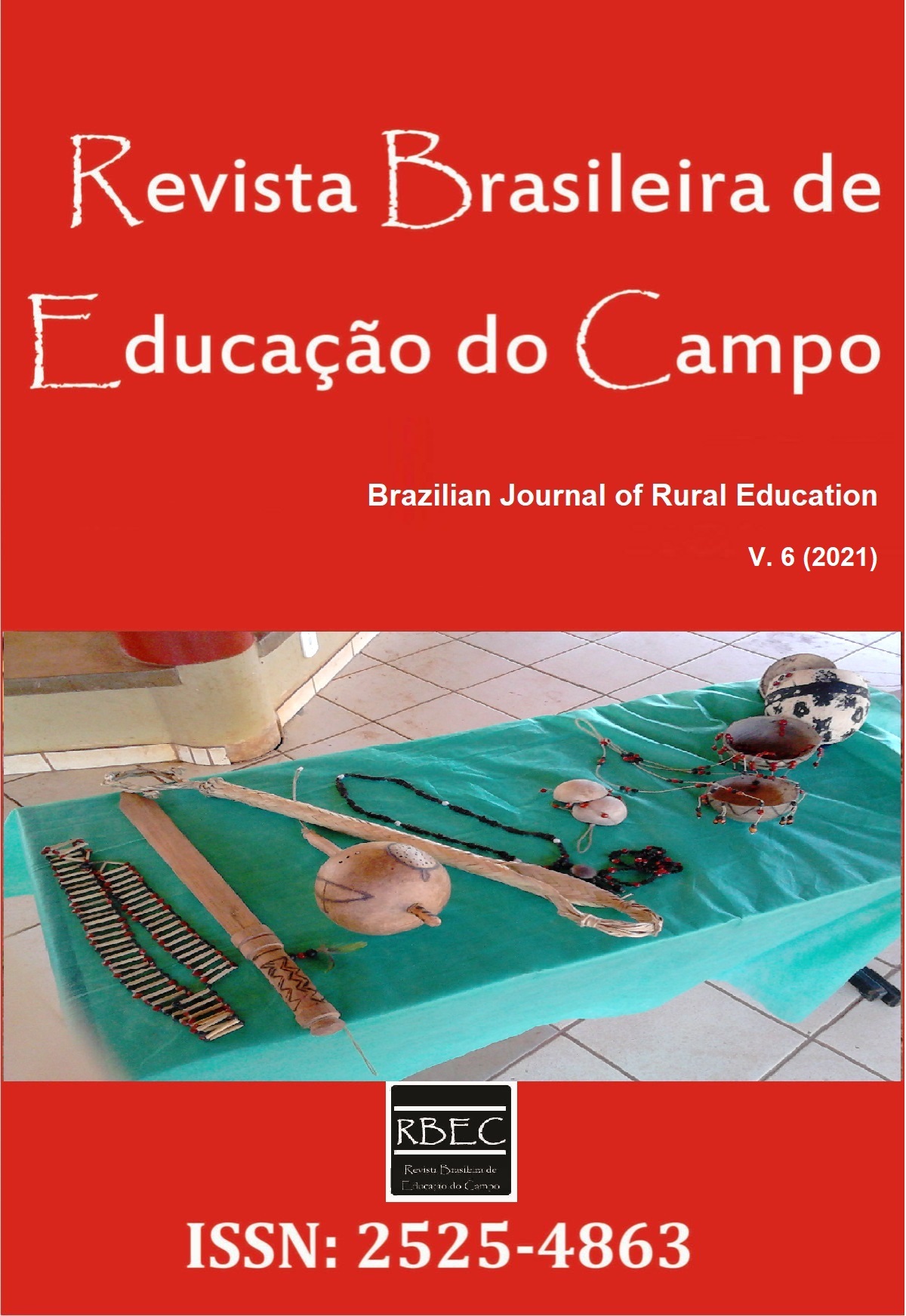Rural Education Degree of the Universidade do Estado da Bahia (UNEB): art and reflections on the pedagogical work of graduates
DOI :
https://doi.org/10.20873/uft.rbec.e12970Mots-clés :
Degree in Field Education, Art, Graduates, Training.Résumé
ABSTRACT. The training of rural educators currently assumes the centrality of the debate on the theoretical-methodological foundations that provide educational processes with an emancipatory perspective. So, the article inquire about the place that art occupies in the teaching work of graduates of the degree in Rural Education, at the University of the State of Bahia (UNEB). The objective is to discuss conceptions and principles of the training of Educators, in the degree course in Rural Education and the contributions of art in this formative process, for the critical analysis of the place that art occupies in the teaching work of graduates. The methodology is anchored in dialectical historical materialism. The course recognition project, research data carried out in 2018 and the application of a questionnaire, by the Google forms digital platform, were used as reference. The results show that art is present in the pedagogical work of graduates, as well as assuming a prominent place. It concludes by pointing to artistic activities as a theoretical-methodological alternative for the training of rural educators and for the pedagogical work they carry out.
Téléchargements
Références
Araújo, G. C. (2016). Arte/educação no campo: algumas reflexões. In Silva, C., Miranda, C. F., Aires, H. Q. P., & Oliveira, U. F. (Orgs.). Educação do Campo, Artes e Formação Docente. Palmas, TO: EDUFT.
Barbosa, A. M. (2012). A imagem no ensino da arte: anos 1980 e novos tempos. 8ª ed. São Paulo, SP: Perspectiva.
Base Nacional Comum Curricular. (2018). Brasília, DF: Ministério da Educação.
Bogo, A. (2002). O Vigor da Mística. Caderno de Cultura nº 02 – MST.
Bogo, A. (2004). A flor e o militante. In Cartas de Amor. Setor de Formação Nacional do MST.
Bogo, A. (2016). Arte do e no Campo. In Carvalho, C. A. S., & Martins, A. A. (Orgs.). Práticas Artísticas do Campo. Belo Horizonte, MG: Autêntica Editora. (Coleção Caminhos da Educação do Campo; 8).
Bogo, A., Boff, L., & Pelloso, R. (1998). Mística: uma necessidade no trabalho popular e organizativo. Caderno de Formação nº 27 - MST.
Canda, C. N. (2010). "PRO DIA NASCER FELIZ": diálogos entre Augusto Boal e Paulo Freire nos estudos de teatro e de educação. Entrelaçando Revista Eletrônica de Culturas e Educação, 1(1), 39-54.
Carvalho, L. F. O., & Ferreira, M. J. L.. (Orgs.). (2020). Práticas Educativas na Escola do Campo e em Outros Espaços Educativos dos Territórios Rurais. Salvador, BA: J&M Editora e Gráfica.
Ferreira, M. J. L., Carvalho, L. F. O., & Bogo, M. N. R. A. (2021). Educação do Campo no âmbito da Universidade do Estado da Bahia: abordagem histórica. Revista da FAEEBA - Educação e Contemporaneidade, 30(61), 17-37.
Frederico, C. (2013). A arte no mundo dos homens: o itinerário de Lukács. São Paulo, SP: Expressão Popular.
Freire, P. (2016). Pedagogia do Oprimido. 60ª ed. Rio de Janeiro, RJ: Paz e Terra.
Haddad, D. A., & Morbin, D. G. (2009). A arte de fazer arte. 3ª ed.. São Paulo, SP: Saraiva.
Miranda, C. F., & Franzoni, T. M. (2016). Diálogos de saberes: A linguagem teatral e a formação do campo. In Carvalho, C. A. S., & Martins, A. A. (Orgs.). Práticas Artísticas do Campo. Belo Horizonte, MG: Autêntica Editora. (Coleção Caminhos da Educação do Campo; 8).
Morissawa, M. (2001). A história da luta pela terra e o MST. São Paulo, SP: Expressão Popular.
Resolução CNE/CP nº 2, de 20 de dezembro de 2019. (2019). Define as Diretrizes Curriculares Nacionais para a Formação Inicial de Professores para a Educação Básica e institui a Base Nacional Comum para a Formação Inicial de Professores da Educação Básica (BNC-Formação). Diário Oficial da União. Brasília, DF: Ministério da Educação/Conselho Nacional de Educação.
Sena, I. F. S. (2019). Prólogo 1. In Wchoa, S. Diálogos Críticos: BNCC, educação, crise e luta de classes em pauta (p. 15-38)
Tolstoi, L. (2002). O que é arte? B. Torri (Trad.). São Paulo, SP: Ediouro. Clássicos Ilustrados.
Universidade do Estado da Bahia, UNEB. (2019). Projeto de Reconhecimento do Curso de Licenciatura em Educação do Campo. Salvador, BA.
Téléchargements
Publié-e
Comment citer
Numéro
Rubrique
Licence
Proposal for Copyright Notice Creative Commons
1. Policy Proposal to Open Access Journals
Authors who publish with this journal agree to the following terms:
A. Authors retain copyright and grant the journal right of first publication with the work simultaneously licensed under the Creative Commons Attribution License that allows sharing the work with recognition of its initial publication in this journal.
B. Authors are able to take on additional contracts separately, non-exclusive distribution of the version of the paper published in this journal (ex .: publish in institutional repository or as a book), with an acknowledgment of its initial publication in this journal.
C. Authors are permitted and encouraged to post their work online (eg .: in institutional repositories or on their website) at any point before or during the editorial process, as it can lead to productive exchanges, as well as increase the impact and the citation of published work (See the Effect of Open Access).














